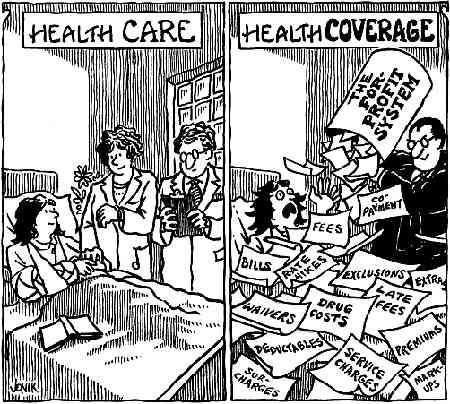|
Cartoons of
Dan McConnell
featuring
Tiny the Worm
Cartoons of
David Logan
The People's Comic
Cartoons of
John Jonik
Inking Truth to Power
|
Support the WA Free Press. Community journalism needs your readership and support. Please subscribe and/or donate.
How Community Organizing Saved Washington Basic Health
Sisters simply organized for survival
by Cee Fisher
The inhumanity of the US healthcare system torments me every day at my job as an injury claims adjuster. I see the anguish of customers who cannot pay exorbitant medical bills after their claims are denied. One day I could no longer sit by as this toxic machine destroys more human life. I wanted to get involved but did not know how to fight effectively until I met the Seattle chapter of Radical Women in the summer of 2009.
At that time, Radical Women was launching Sisters Organize for Survival (SOS), a grassroots campaign to mobilize working people to defend themselves in this time of economic crisis. The movement found a focus in fighting budget cuts spurred by the recession and Washington state's unsustainable, regressive tax structure, in which the poorest pay the most in taxes as the wealthiest skate by paying little.
The Basic Health Plan, which subsidized health insurance for 100,000 low-income people, had been chopped by 43 percent or $238 million. Governor Christine Gregoire announced she would eliminate the program completely in 2010 if that would help balance the budget.
SOS began to organize to save Basic Health and guard it against further cuts. We called for expanding the program to cover all of Washington's 900,000 uninsured, while not undermining other services. The battle cry: Fund Basic Health, education, and other crucial programs by a steeply graduated income tax on the rich and a tax on corporate profits!
The fight for Basic Health did not rely on fancy ads or high-paid lobbyists. It was not buttressed by Democratic politicians, who mostly backed the cuts like their Republican counterparts. Instead, SOS found ammunition in swelling community anger at the government's lack of concern for human needs and built this into a solid, organized fight-back.
A strong core of activists and endorsing organizations came forward to work with SOS in Seattle, Tacoma, and Olympia. Community-building involved extensive outreach—contacting thousands of Washingtonians via telephone, e-mail, snail-mail, and doorbelling. SOS sisters and brothers circulated information about cuts to Basic Health and other services, and put forward the sensible solution to tax wealth to adequately fund these programs.

cartoon by John Jonik
We allied ourselves with public workers, who were threatened with furloughs and pay cuts, and connected with unionists, people of color, queers, students, and healthcare groups. We joined forces with working-class women who are disproportionately affected by the recession. As services are eliminated, the burden gets piggybacked on them, along with their many other unpaid responsibilities.
The campaign initiated many opportunities for community members to express their dissatisfaction and raise their demands to public officials. A hundred people, including a supportive Democratic state senator, attended an emotion-packed "Community Tribunal to Save Basic Health," which found the governor and legislators guilty of neglecting the poor. The assembly discussed the faulty healthcare system at both state and national levels and adopted a plan of action to pressure state leaders to fund Basic Health and other services through a fairer tax structure.
SOS held call-in campaigns that flooded legislators' phone lines and pushed them to provide for the community's needs. We did a huge petition campaign. The 3,700 signatures were delivered at a media-grabbing "State of Emergency Rally" on the Capitol steps before the Governor's State of the State Address on January 12.
On January 22, the 37th anniversary of the Roe v. Wade decision legalizing abortion, SOS called another demonstration in Olympia in defense of reproductive rights and Basic Health; without healthcare, women have no real control over their own bodies.
It was clear that the solidified strike-back was working when, a few months into the campaign, the governor changed her perspective on Basic Health. Her all-cuts rhythm shifted to a stated desire to save Basic Health at all costs. Throughout the prolonged legislative session, SOS kept up the pressure on legislators, until a budget package that funded Basic Health at its current level was finally released in mid-April.
As a result, some 69,000 low-income people now continue to receive state-subsidized health insurance! This is a definite victory for the SOS-led community struggle. The state budget is not what SOS demanded—instead of creating an income tax for the rich, it raised taxes instead on cigarettes, soda, candy, bottled water, and big "macrobrew" beers.
However, SOS clearly amplified the sound for an income tax on the rich. Our pressure got a senate hearing on a long-stalled bill introduced by Sen. Rosa Franklin that would establish a graduated state income tax. SOS testified and mobilized a dozen striking students from nearby Evergreen State College to add their incendiary voices. This all boosts future efforts for tax reform.
Though Basic Health kept its funding for another year, it and many other programs remain on shaky ground. SOS has proven that a well-organized, militant community fight-back can win. We are proud to have created a powerful impetus that held the line for the state's most vulnerable, and we will continue to mobilize working people to act in our own defense against a predatory system.
Cee Fisher is a leader of Sisters Organize for Survival. Drop her a line at ceetre53@gmail.com.
The above article first appeared in the Freedom Socialist newspaper, June-September 2010 issue. Visit www.socialism.com.
◆


